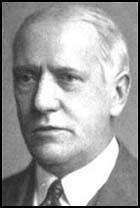William Berry, Viscount Camrose

William Berry, son of John Berry, an estate agent, was born in Merthyr Tydfil on 23rd June 1879. At the age of fourteen he started work as a journalist on the Merthyr Times.
After working on other newspapers in Wales he moved to London in 1898 where he found work on the Investors' Guardian. In 1901 Berry started his own newspaper, Advertising World. Without any staff, Berry wrote every word of the first issue.
Advertising Worldwas a great success and providing the capital to start a series of new publications including the popular journal, Boxing. In 1915 Berry purchased the Sunday Times. At the time it had a circulation of only 50,000. Its main rival, the Observer, sold over 200,000 copies a week. Barry, who became editor-in-chief, was able to increase its circulation to a point where the Sunday Times outsold the Observer.
In 1919 Berry purchased the Financial Times. After establishing Allied Newspapers in 1924 with his brother, Gomer Berry, he acquired a series of newspapers and journals including the Graphic, the Daily Dispatch, the Daily Sketch, the Manchester Evening Chronicle and the Sunday Chronicle.
Lord Burnham, who was heavily involved in political work, decided to sell his newspaper, the Daily Telegraph, to Berry in 1927. The Berry brothers now controlled two national and six provincial morning papers, eight provincial evening papers, eight provincial weeklies and about seventy periodicals.
Berry was raised to the peerage (Baron Camrose) in 1929. Over the next few years he concentrated on restoring the fortunes of the Daily Telegraph. On 1st December 1930 he reduced the price from 2d. to 1d. and within a few weeks the circulation doubled to over 200,000. In 1937 Camrose purchased the right-wing Morning Post. This was then amalgamated with the Daily Telegraph.
Camrose had been brought up as a Liberal but by the 1930s he was a progressive Conservative. He broke with Neville Chamberlain over appeasement and became a strong supporter of Winston Churchill. On the outbreak of the Second World War, Camrose served for a short period as Minister of Information.
Throughout the war Camrose continued to work on improving the sales of the Daily Telegraph. He took great care with the appointment of staff and was also personally involved in the layout of the newspaper. By 1949 the circulation had reached 1,015,514.
William Berry, Viscount Camrose, died in Southampton on 15th June 1954. His eldest son, John Seymour Berry, inherited his title and his second son, Michael Berry, became editor-in-chief and chairman of the Daily Telegraph.
